Blog post for Jan 11, 2019
Location: Tamale, Ghana
We dedicate this page to Dr. Lamin Sanneh, a professor at the Yale Divinity School, and a prolific scholar, whose writing on the Jakhanke clerics of Senegambia did so much to redefine scholarship on Islam in West Africa. His recent books include on Beyond Jihad (2016) and Home Coming (2018). He signed the latter copy for me during our last meeting of advisors for the establishment of the Sanneh Institute in Ghana from December 10 to 13. Born into a Muslim family, he however became a Christian, and worked so tirelessly on Christian Muslim dialogue. He passed on Jan 6, 2019. Our condolence to the wife and the children.
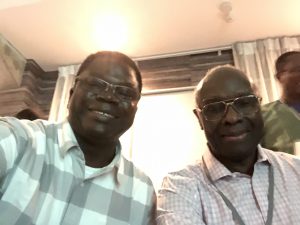
Picture taken when he signed my copy of Home Coming.
In Tamale
We all woke up for a morning breakfast, and afterwards set back to the hotel for forgotten items and bathroom breaks. After stopping for some fresh coconut water and pineapple for those who wanted it, we set out for a lecture by our very own Professor Abdulai Iddrisu. On the way to the lecture we witnessed the masses of people heading to the funeral of the overlord in Yendi (the capital of Dagbong).
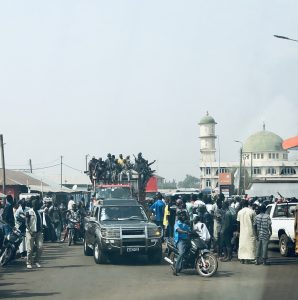
For many chiefs, this is an important event as it marks the electotion of a new overlord of Dagbong. We witnessed buses filled with primarily men, many even riding on top when there lacked room inside the vehicle, the women sitting comfortably inside the cars. A few individuals were armed with muskets, as it is part of the funeral tradition to fire the musket at the service.
The news papers in Ghana are focusing on this event as the most important event of the day. The funeral marks tensions between chiefdoms towards who will secure the leadership position next and violence is threatening the peace of the funeral. (https://mobile.ghanaweb.com/GhanaHomePage/NewsArchive/Dagbon-peace-process-threatened-one-dead-three-injured-in-renewed-clashes-714360).
We took a short bus ride to the University for Development Studies, Nyankpala Campus that specializes in agriculture and natural resources. Dr. Damba led us to Dr. Awuni, the head of department, who welcomed us to the campus. At the lecture, we discussed Islam’s understanding of slavery, and how it impacted the Atlantic slave trade. In preparation and in honor of Prof. Lamin Sanneh, who passed on Jan 6, and as described in the opening paragraphs, we all read, “Slavery, Islam and the Jakhanke People of West Africa.” We discussed the firm legal foundations upon which Islamic scholars in the past have viewed slavery. God created man to enjoy freedom, but to enjoy that freedom two conditions have to be fulfilled. First, is being a Muslim and the second, if not a Muslim is to convert or pay the dhimni tax, for protection by the Muslim community. However, this brings about lots of complications. Prof. Iddrisu added that Ahmad Baba, in response to questions intimated that people born as Muslims must not be enslaved, but quickly questioned how one was able to find out if someone was born a Muslim? Who has the luxury to stop in their procurement of slaves through war to question each one if they were born Muslim?
In any case, we also discussed the Jahanke clerics of Senegambia and their pacifist tradition traced to Sheikh Salim Suweri that stipulated that Muslims must not participate in war because of it’s negative impact on piety. Muslims must not also proselytize, for their own good behavior will serve as a model for others to emulate. But then, the clerics provided amulets and prayers for the likes of Samori and other slave raiders when they go to war, and were compensated with slaves. This allowed the clerics to focus on reading and clerical work, while the slaves did their agricultural work to feed them.
After the lecture, we attempted to pick up headscarves for the women in order to dress appropriately for our anticipated attendance at a mosque for Jumat prayer session but due to lateness the group stood outside and observed.
After the Manhaliyya mosque, at the old Kaladan Barracks, and though we stood ourside, many people who couldn’t pray inside had to pray outside in a shade. We noted that men stood in front and the women at the back. At the mosque, the women stood in the back while the men were in the front. Something many of us had never seen before, it was interesting to see how many people were attending the service- so many that people were pouring out of the mosque itself. There were also many youths and children there, and they knew what to do as much as the adults. We took a picture with the officiating Imam, Afa Iddi.
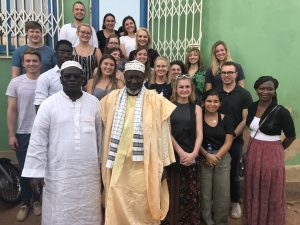
Afterwards, we hung out at the hotel for a few hours while we waited for a local dance group to perform at our hotel. We watched traditional Simpa dances, capping off the night with group dancing.
Some of us wanted to try out the moves but it appears as though we might need some practice.
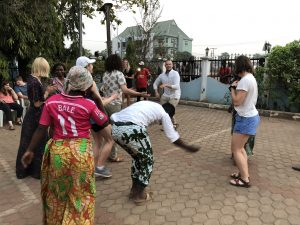
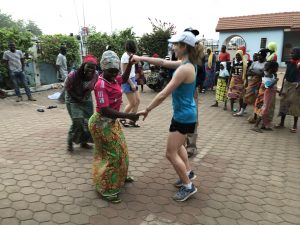
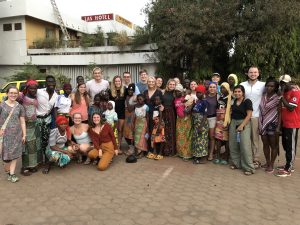
We had a picture with the Bilpella Simona group that came to entertain us. We are looking forward to another treat with a Bamaya group from the Youth Home this coming Friday
Even Abdulai got his dance on, so that was the cherry on top of the night.
20275C55-FF85-407E-84DD-DD78CB50512B
We had take-away dinner and retired to bed.
Morgan, Kristina, Vanessa, and Ella.
